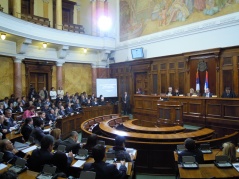On 30 January, at the National Assembly House, the European Integrations Committee organised a public hearing on “The National Assembly on the Road to European Integration”.
Opening the gathering, European Integrations Committee Chairman Laszlo Varga said that this was an opportunity to summarize the results of the National Assembly and Government’s work at the end of the mandate. The Committee plans to hold two more public hearings on the topic.
Greeting the participants, National Assembly Speaker Prof. Dr Slavica Djukic Dejanovic stated that, in the previous period, the National Assembly had adopted a number of laws and other acts harmonising Serbia’s legal system with that of the European Union.
She reminded that the National Assembly was a natural place to debate the European Union accession and confront opinions and arguments for and against the European Union.
Milica Delevic, of the European Integration Office, stressed that Serbia has already benefited from the European integration process as it has created the institutional and legal framework to improve the functioning of the legislative, executive and judiciary power, as well as for the work of independent regulatory bodies. She reminded that, in the last several years, the European Union has been Serbia’s biggest trade partner, while Italy and Germany have been Serbia’s biggest partner countries in trade.
The biggest investors into Serbia, as far as direct foreign investment is concerned, were Austria, Norway, Greece, Germany, Italy, the Netherlands, Slovenia and Russia. European Union countries were also Serbia’s biggest donors with 2.2 billion EUR, said Milica Delevic.
The Head of the EU Delegation to Serbia Vincent Degert expects that Serbia will meet the necessary requirements for EU candidate status in 2012. He reminded that the European Commission had noted that Serbia has taken huge steps in reform, enabling the Commission to recommend Serbia for candidacy status. Though progress was clearly noted on 9 December last year, it was concluded that the progress should be continued in the dialogue between Belgrade and Pristina. The three key requirements are implementation of the agreements reached so far in practice, progress in regional cooperation and allowing EULEX and KFOR mandate on the whole territory of Kosovo-Metohija.
Degert also stressed that the anti-corruption struggle, reform of the media and judiciary and economic competitiveness should continue to be a high priority.
The representatives of the parliamentary groups comprising the majority in the National Assembly agreed in the estimate that Serbia’s European road has no alternative and that all efforts should be directed toward gaining candidate status. However, the opposition representatives criticised the Government, as well as EU policy which they claimed was unfair to Serbia.
Sharing data on the number of adopted laws, Momo Colakovic, Head of the PUPS Parliamentary Group, concluded that it was impossible to pass all the reform laws in one assembly convocation and emphasised the importance of the adopted social security laws. Head of the Minorities’ Parliamentary Group Balint Pasztor said that gaining candidate status was just the beginning of the accession process, expressing an expectation that the Serbian Government would be brave enough to meet the criteria to be granted that status.
Head of the New Serbia Parliamentary Group Velimir Ilic asked why Serbia has not already gained EU candidate status if all the Director of the European Integration Office said was true. He said that no one really knows what the agreements signed with Pristina contain, stating that during the current mandate corruption has risen by 40%, both agricultural and industrial production has declined and 300 thousand people have lost their jobs. The representative of the Liberal-Democratic Party Parliamentary Group Ivan Andric criticised the Government because, after the resignation of Bozidar Djelic, Deputy Prime Minister for European Integration, no one in the Government wanted to deal with European integration. EU’s flaws notwithstanding, European integration is the best road Serbia could follow, said Andric.
The representative of the SPS Parliamentary Group Djordje Milicevic stated that it was important that after the election Serbia got a responsible and efficient government who would defend Serbia’s national interests and ensure the country a favourable international position. He stated that Serbia belonged in the EU, but that it had to, first of all, turn to itself and address the outstanding issues.
On the behalf of the DSS Parliamentary Group, Slobodan Samardzic stressed that Serbia should turn over a “strategic leaf” in the Euro-integration process due to the demands to give up Kosovo-Metohija and because of the damages it suffers through the implementation of the Stabilisation and Association Agreement. He deemed it necessary for Serbia to review the European integration policy.
On the behalf of the Serbian Radical Party Parliamentary Group, Dejan Mirovic said that it was absolutely against Serbia joining the EU which was not a good choice. He reminded that Russia was Serbia’s biggest foreign trade partner.
On the behalf of the United Regions of Serbia Parliamentary Group, Suzana Grubjesic said that she never claimed that the EU has no alternative, but that it should be known what it really represented. We do not have to do everything because of Brussels, said Suzana Grubjesic, rather we should concentrate on organising the state.
National Assembly Deputy Speaker Gordana Comic, on the behalf of the For European Serbia Parliamentary Group, stressed that Serbia should show that it was ready and able to bring all the negotiations to a successful completion and be granted EU candidate status. She also opined that all future Serbian governments would deal with the European integration issue.
MPs Zoran Krasic and Momir Markovic, as well as representatives of the European Movement in Serbia took part in the debate. 




